
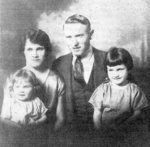
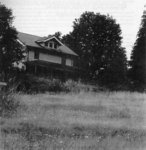
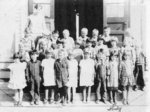
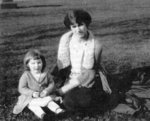
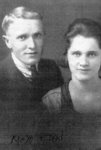

As an infant living in a logging camp house, a wooden structure with wind whistling through cracks in the floor despite the Army blanket stuffed there to keep it out, little Shirley French often awakened to the sweetened canned milk in her baby bottle frozen overnight.
By the age of 6, Shirley, born in a big house on a hill outside Rochester, had survived whooping cough, chicken pox, red measles, German measles and the mumps. She was vaccinated against smallpox Nov. 15, 1931.
As a child growing up in the Great Depression, her family moved to a dozen different homes between Rochester, Grand Mound, Tenino, Tacoma, Huntington Beach, California, and the area between Bucoda and Centralia.
“In order for my dad to find jobs, we moved every two years,” she said. “It was very difficult.”
She not only survived but thrived. Last month Shirley (French) Nelson celebrated her 100th birthday at Woodland Village in Chehalis.
Her father, Leslie French, was born Oct. 17, 1901, in Grand Mound to Caroline Isophene Pearce and Emory Dalton French, the second of their three children. He worked as a logger and mechanic. Her mother, Ida Betts, was born May 29, 1903, one of Arthur and Maycie (Van Dyke) Betts’ nine children who grew up in that big house on a hill outside Rochester. She worked as a switchboard operator and a waitress.
The two met during a dance at the Rochester grange hall.
“They were removed from the dance floor more than once for gliding,” she said. “This involved steps like you were on ice.”
They married before a justice of the peace on June 26, 1920. A year later, July 2, 1921, Ida’s family hung a white cloth on the front porch to signal the midwife down the road, who helped deliver Shirley, a 9-pound, 19-inch-long baby. Three years later, her sister Elizabeth “Betty” arrived. Their family physician was Dr. Dale O. Nugent.
When Shirley was 5, the family suffered a tragedy with the death of her uncle, First Lt. Harry W. French, who had served with Company 863 of the Transportation Corps in France during World War I. He survived the war but died April 14, 1926, at Fort Benning in Georgia when his horse stumbled during a polo game and rolled over him. He was a month shy of his 30th birthday. French Field at Fort Benning in Chattahoochee, Georgia, is named in his honor.
Shirley and her family lived in a little house near her grandfather’s Grand Mound home on Prather Road. A parrot at her grandparents’ home often chanted, “Come Spad time to get the cows,” referring to the name of the German shepherd dog given to her grandfather by her Uncle Harry.
When their parents took them to dances, they often fell asleep on makeshift beds — piles of coats lying on benches around the dance floor.
After living in the logging camp, the family moved to Rochester in 1926 to set up a temporary home in Grandma Maycie’s garage before finding a rental house. That’s when Shirley started school, learning from Mr. McArthur and beginning piano lessons. Then they moved to downtown Rochester, where her Grandma Maycie owned a café near the corner drugstore. Her mother ran the café and the family lived in quarters behind it.
“We had slot machines, and Betty and I would wait until the player left and go check them to see if there were coins left,” she wrote in her memoir “From Here to Eternity.” Another time, when the drugstore’s burglar alarm shrilled, her father pulled out his shotgun, opened a window and fired at what he thought was a man crouching in the nearby vacant lot.
“My mother exclaimed, ‘My God, you killed him!’ As it got lighter, it turned out Dad had shot at and hit empty milk cans that had been thrown there for a farmer to pick up.”
Her father found a job in Tacoma, so the family moved, and Shirley attended second and third grades at Whitman Elementary School. When they first arrived, Shirley’s mother sent her father under the house to see if something had died — until they discovered the Asarco Company’s copper smelter produced the rotten egg stench.
Then her father started logging for Mutual Lumber Company east of Tenino. They lived in the logging camp, one of about 14 families there, and Shirley and Betty attended the one-room schoolhouse where Miss Perry and later Hulda Rankin taught students in all eight grades.
Each two-bedroom cottage had running water and an outhouse but no electricity. Every Saturday night, they took baths in the washtub hauled into the kitchen and filled with water heated on the woodstove. To do laundry, Shirley’s mother used a gas-fired washing machine.
Then they moved again when her father’s brother-in-law, Robert Mitchell, offered him a job as a mechanic in a shop on Figueroa Street in Los Angeles. They lived in Southgate and later Huntington Park, where Shirley attended school for two years and started playing the saxophone.
“About the end of the second year, the teacher told Mom if I were a boy I could go far in music,” Shirley wrote about life in 1932 Los Angeles. “We signed up to start an all-girl orchestra with the director Phil Spitalny.”
Then one evening shortly before Christmas, Shirley was practicing her saxophone in the front room, her mother was in the kitchen, and her father, who had arrived home early for a change, was washing up for dinner in the bathroom.
Her little sister, Betty, was babysitting next door.
Suddenly, everything started shaking. Her parents rushed from the kitchen into the backyard.
“I joined them though things were falling in the kitchen,” she said. “It’s a life experience that you’d never forget.”
The epicenter of the 7.2-magnitude Cedar Mountain earthquake Dec. 20, 1932, may have been near Winnemucca in western Nevada, but its shock waves rippled through Southern California, Oregon and the Rocky Mountains. After several days of aftershocks, the family decided to stay with friends in Hollywood but still experienced tremors.
“I remember lying on the floor in a bed that they had made, looking up, and I was right under the chandelier,” she said. “Of course, it was shaking. My dad would almost have to pry my sister away from under the door casing, because she was afraid. She was terrified.”
That settled it for their father.
“After a week of aftershocks, fire and ambulance sirens, Dad made the decision: ‘We’re going home; life is too short to live in fear.’”
They returned to Tenino and the Mutual Logging Camp, which operated from 1923 until 1944, and the one-room school.
“I remember helping peel carrots for vegetable soup for school lunch,” she wrote.
That winter, the family left the logging camp for Tenino so Shirley could play in the orchestra during the Christmas program.
“We slid down the hill on the plank road, ending at the bottom on the bridge that crossed the creek,” she recalled. “Somehow we got back up the hill and, needless to say, I missed the performance that time.”
I’ll share more of Shirley’s story next week.
•••
Julie McDonald, a personal historian from Toledo, may be reached at memoirs@chaptersoflife.com.